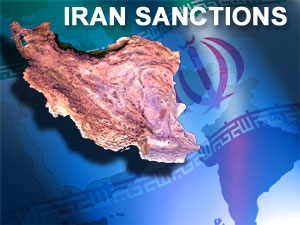 The Iranian government has looked more willing to compromise in nuclear negotiations since the threat of an oil embargo
The Iranian government has looked more willing to compromise in nuclear negotiations since the threat of an oil embargoThe Iranian government has�claimed on numerous occasions�that sanctions can't influence its nuclear policies and�will not do so in the future. However, its own behaviour tells a different story.
In the two sets of negotiations between Iran and the P5+1 (United States, Russia, China, United Kingdom, France and Germany) in 2010 and 2011, the Iranian negotiations team�refused to even address confidence-building proposals made by the P5+1. What Iran did instead was to demand that existing sanctions be lifted and that the P5+1 recognise Iran's right to enrich uranium.
But things changed after the EU announcement on 23 January 2012 that it will impose an�oil embargo�against Iran this July. After the announcement, the Iranian regime � despite its previous rhetoric � did change its stance by starting to show willingness to address and discuss what it had ruled out during negotiations with the P5+1 in 2010 and 2011, namely proposals and suggestions from the P5+1.
This was first evident in the letter that Iran's chief nuclear negotiator Saeed Jalili sent to the P5+1's�chief nuclear negotiator Catherine Ashton, on 15 February, three weeks after the EU declared its oil sanctions plan. A senior diplomat who had dealt with Iran for more than a decade described the letter as a "breakthrough" because "it directly mentions willingness to focus talks on the nuclear issue and avoided past versions' lengthy diatribes against perceived international double standards". This is in fact one of the reasons why the Istanbul negotiations, which took place afterwards in April last year, were described as�"positive". Meanwhile, at the next negotiations in Baghdad in May 2012, both sides continued to discuss�specific proposals.
This continued in the next set of negotiations in Moscow where, according to the�New York Times: "Iranian negotiators for the first time delivered a detailed response to a set of proposals first presented to them at a meeting last month in Baghdad. A senior American official, speaking on the condition of anonymity because of the delicacy of the talks, said this had happened for the first time in many years."
At the next meeting in Istanbul on 19 September 2012, according to Iran's ambassador to the IAEA,�Iran offered to suspend uranium enrichment at 20%�"if the west lifts sanctions against Tehran". Although this offer was only for a suspension, this was nevertheless a breakthrough, as prior to the EU oil sanctions announcement, the Iranian government had refused to even address its 20% enriched uranium process.
Iran's new willingness also influenced the next sets of talks in Almaty, Kazakhstan, that took place in February and another round that started earlier this month. Although an agreement has not yet been reached, at both meetings the two sides�discussed each other's proposals in more detail�than before. This included talking about Iran's 20% enrichment.
Had it not been for the sanctions, the Iranian government would have had little incentive to change its strategy of the 2010 and 2011 negotiations with the P5+1, which focused solely on its own demands. This could have led to the eventual breakdown of the diplomatic process.
Recent sanctions have also affected Iran's decision-making about its stockpile of 20% enriched uranium.
Iran�started producing 20% enriched uranium�in February 2010, yet the supreme leader,�Ayatollah Ali Khamenei, never started putting part of it beyond possible use for a bomb by turning it into nuclear fuel. He just kept on producing it and stockpiling it. This is despite repeated proposals by the P5+1 to do this abroad as part of a swap deal.
However, according to an�Arms Control Now report�quoting theInternational Atomic Energy Agency, it was reported by the latter in its August 2012 report that Iran had itself had started doing exactly that.
The fact that Iran started doing this after the announcement of the EU oil sanctions in January 2012 is another indication that sanctions have affected its nuclear strategy. A strategy that shows sensitivity to pressure.
Sanctions on their own are by no means a silver bullet. Both sides need to show commitment to the diplomatic process, to show willingness to compromise and to address each other's concerns.
Despite some of their limitations, sanctions have proved themselves to be effective. The regime in Iran is a calculating and a rational regime. If sanctions continue to hit Iran hard, it's very unlikely that Khamenei would choose to act out the rhetoric of�"not giving in to western pressure"�rather than rescue the regime's lifeline � its economy.
By The Guardian
The Iran Project is not responsible for the content of quoted articles.










